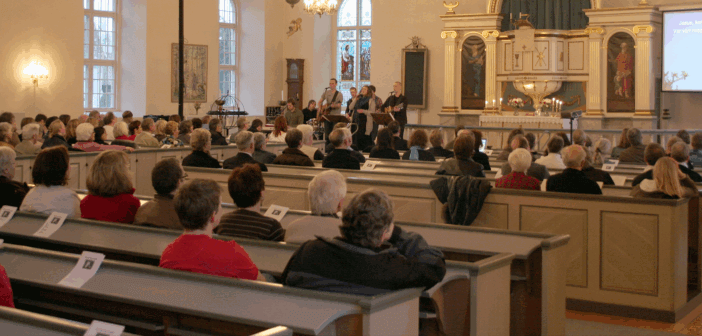Worship is the primary formational space in most congregations, yet many churches rarely consider what they hope will happen during the service. Emily Peck invites leaders to name their core values and design worship that intentionally forms disciples within their unique context.
Worship brings faith communities together. As a Christian formation professor, I always challenge my students to think about what they want to teach or how they want to form the people who come to worship. Although there are lots of ways to go to church—working in the food pantry, committee meetings, fellowship opportunities, cooking meals for the youth group—when people say they “go to church,” they are likely talking about attending worship.
Worship committees and pastors think together through different elements of Worship, from seasonal visual arts to choosing themes and sermon series. Because this is the main formational event of a church, I always wonder if we think enough about what we want to happen during worship. I don’t mean what hymns we are going to sing or what the scripture verses are going to be for the week, I mean, I wonder if we think about what we want to happen to us (the worshippers) during worship.
Considering this question leads to a much more fundamental question: Why do we worship at all? Ritual theory gives us a lot of insight into what can happen when communities come together over rituals, worship of course being a powerful one. We practice beloved community together, we mark time together, and we create together. Liturgy, after all, means “The work of the people.” Worship requires participants, not passive attendees. Søren Kierkegaard famously compared worship to theater, saying that too often we think about worship as something being performed by the pastor and the leaders while the audience looks on from the pews with the star of the show being God.
Instead, Kierkegaard says those in the pews are the actors, the leaders and pastors are the prompters, and the audience is God. We worship so that we can work together and be formed together for our God who watches us, delighting in our joys and meeting us in our sufferings.
At The Hub for (Re)imagining Ministry, we often ask churches who work with us to think about the values their congregations hold. In my classes, I encourage students to think about what a “well-formed Christian” might look like in whatever ministry contexts they either serve or know well. This helps guide our thinking about Christian formation in general, but also in each context specifically. Many churches might have the same general goals. I often hear things like, “We want people to know God loves them and we want them to love their neighbors well,” and, “We want people to see that helping meet the needs of those in our larger community is part of our Christian faith,” and, “We want people to invite people to come to church and to be welcoming of newcomers when they show up.”
But it helps to think about those generalities in specifics:
- What does it look like in my church for someone to know God loves them?
- What does it look like in my church for someone to love their neighbor well?
- What does it look like in my church for someone to see that helping others is part of their faith?
- What does it look like in my church to be welcoming to newcomers?
Those answers will be different for each congregation because each faith community is unique. Once we think carefully about values and how they show up in a specific context, then churches who work with The Hub can start designing ministries that will help those who participate in them to reflect these values and the ways they show up specifically in each context.
This is helpful work to do with a leadership team, worship committee or church council when it comes to worship! What do we want to happen to the people who come to worship in our church, including those of us who lead that worship? Maybe it’s “meet God” or “praise God” or “Connect with other believers,” or “Be built up for the week ahead!” Or a combination of these or something else completely.
Once a faith community starts to think about their values, they can start thinking about how worship is going to provide the space Christian formation that reflects the values of their specific context, with the help of the Holy Spirit. Certainly, hymn choices and scripture verses and sermon themes will be a part of it, but with the help of the Holy Spirit. The possibilities are endless for what else a group of leaders might decide to try.
For example, you want those who come to worship in your church to be formed into people who will connect with other believers. This might change the way seating happens or the passing of the peace or the sharing of prayers. This might change whether and when children are present and engaged in worship. This might change how accessibility is considered. We can’t connect deeply with other believers through worship if we don’t see or speak with them. We can do the work of liturgy with our fellow actors if we don’t share lines with them. We can’t love as Jesus loved if we don’t know their names and what their passions are, or their deepest prayers.
This week, consider:
What do we want to happen to us in worship at this specific church?
Invite leaders, children, and youth into the conversation! You might be surprised to hear what people expect and hope will come out of worship, and it might just offer you some really good ideas for how to make some small, but meaningful, changes.
Related Resources
- Ask Better Questions: Turn Sunday Small Talk into Sacred Conversations by Laura Heikes
- Saying Goodbye In The Sermon by Beverly Zink-Sawyer
- Improv Church: The Power of Connection featuring Katie Phillips and Doug Powe — Watch the Leading Ideas Talks podcast video | Listen to the podcast audio version | Read the in-depth interview
If you would like to share this article in your newsletter or other publication, please review our reprint guidelines.
Photo by David Castor at Wikimedia






